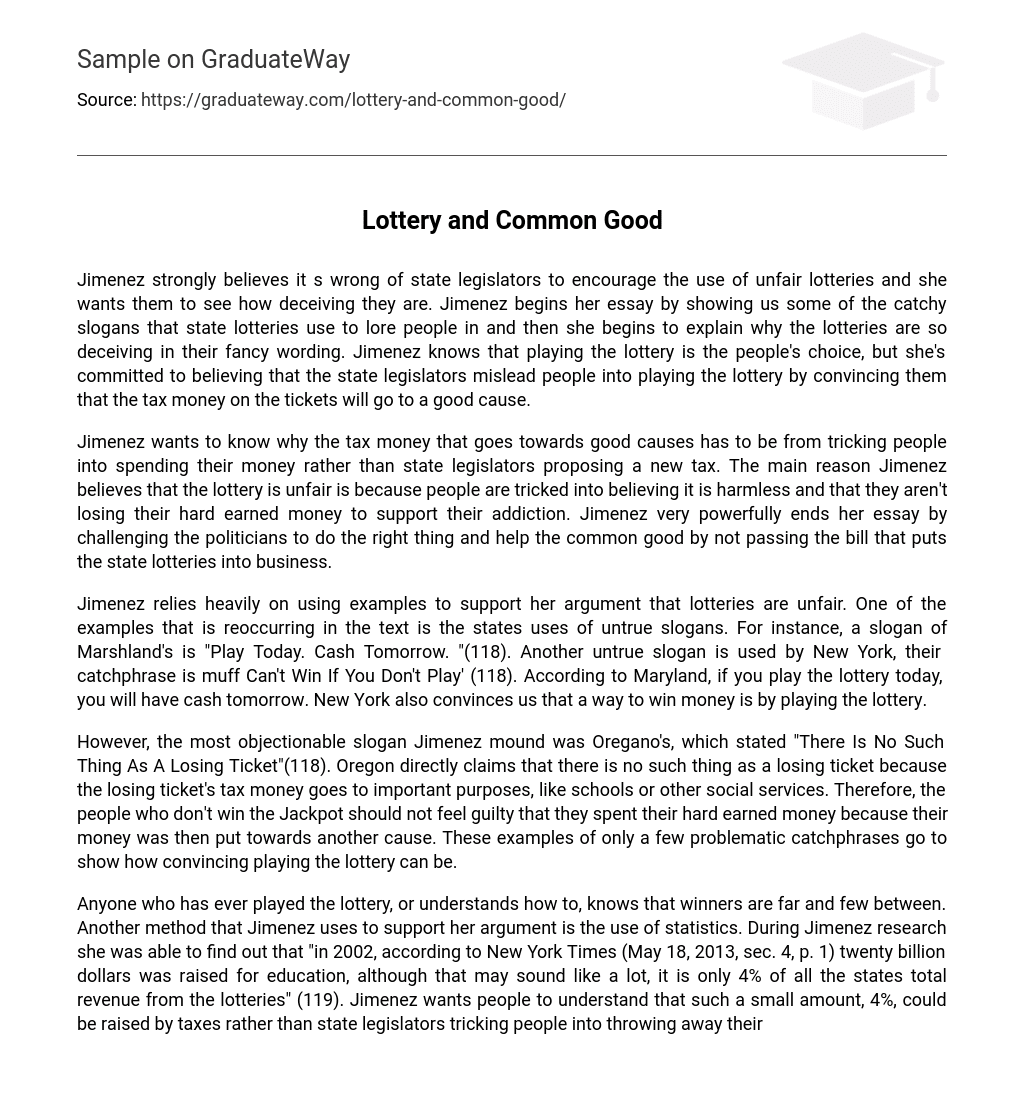Jimenez strongly believes it s wrong of state legislators to encourage the use of unfair lotteries and she wants them to see how deceiving they are. Jimenez begins her essay by showing us some of the catchy slogans that state lotteries use to lore people in and then she begins to explain why the lotteries are so deceiving in their fancy wording. Jimenez knows that playing the lottery is the people’s choice, but she’s committed to believing that the state legislators mislead people into playing the lottery by convincing them that the tax money on the tickets will go to a good cause.
Jimenez wants to know why the tax money that goes towards good causes has to be from tricking people into spending their money rather than state legislators proposing a new tax. The main reason Jimenez believes that the lottery is unfair is because people are tricked into believing it is harmless and that they aren’t losing their hard earned money to support their addiction. Jimenez very powerfully ends her essay by challenging the politicians to do the right thing and help the common good by not passing the bill that puts the state lotteries into business.
Jimenez relies heavily on using examples to support her argument that lotteries are unfair. One of the examples that is reoccurring in the text is the states uses of untrue slogans. For instance, a slogan of Marshland’s is “Play Today. Cash Tomorrow. “(118). Another untrue slogan is used by New York, their catchphrase is muff Can’t Win If You Don’t Play’ (118). According to Maryland, if you play the lottery today, you will have cash tomorrow. New York also convinces us that a way to win money is by playing the lottery.
However, the most objectionable slogan Jimenez mound was Oregano’s, which stated “There Is No Such Thing As A Losing Ticket”(118). Oregon directly claims that there is no such thing as a losing ticket because the losing ticket’s tax money goes to important purposes, like schools or other social services. Therefore, the people who don’t win the Jackpot should not feel guilty that they spent their hard earned money because their money was then put towards another cause. These examples of only a few problematic catchphrases go to show how convincing playing the lottery can be.
Anyone who has ever played the lottery, or understands how to, knows that winners are far and few between. Another method that Jimenez uses to support her argument is the use of statistics. During Jimenez research she was able to find out that “in 2002, according to New York Times (May 18, 2013, sec. 4, p. 1) twenty billion dollars was raised for education, although that may sound like a lot, it is only 4% of all the states total revenue from the lotteries” (119). Jimenez wants people to understand that such a small amount, 4%, could be raised by taxes rather than state legislators tricking people into throwing away their hard earned money.
Another fact that Jimenez was able to find is that “adults whose income was under $10,000 spent nearly three times as much buying lottery tickets as did adults who earned $50,000 or more. “(119). This statistic shows that most of the people buying tickets are bought by people in the lower class. Jimenez knows that by using hard facts and a credible source that people are surely to be on her side of the argument. Alongside examples and statistics, Jimenez uses deductive reasoning to help support her argument.
For example, she writes “But the lottery tickets are sold in places where clerks are already employed. “(118). Jimenez states this to prove to the people claiming that the lottery creates Job that it does not create Jobs. It’s obvious to understand that places where lottery tickets are generally sold, like convenience stores, did not hire new employees to sell lottery tickets. The clerks who sell lottery tickets had those Jobs prior to the lottery. In deduction, this means that store clerks have their Job to run the store accordingly, not to simply sell lottery tickets.
In my opinion, Gloria Jimenez makes her point in proving how deceiving and unfair lotteries can be, but I don’t think she targeted the right audience. I believe the common good is the audience rather than the state legislators who are the cause of her problem. However, I do believe that her argument proved her point extremely well. After reading the essay Against the Odds, and against the Common Good the audience can see by her use of examples, statistics, and deduction that her idea of state legislators being advocates of pickpocket is the thesis.





